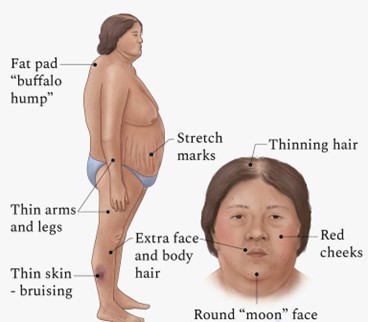A nurse is collecting data from a client who has Cushing’s syndrome. Which of the following findings should the nurse expect?
Weight loss
Diaphoresis
Hyperpigmentation
Hypotension
The Correct Answer is C
Choice A reason: Weight loss is not a symptom of Cushing’s syndrome. On the contrary, weight gain and obesity are common signs of this condition, especially in the trunk, face and upper back1.
Choice B reason: Diaphoresis, or excessive sweating, is not a symptom of Cushing’s syndrome. It can be caused by other conditions, such as hyperthyroidism, menopause or anxiety.
Choice C reason: Hyperpigmentation, or darkening of the skin, is a symptom of Cushing’s syndrome. It occurs due to increased production of melanin, the pigment that gives color to the skin. Hyperpigmentation can affect any part of the body, but it is more noticeable in areas exposed to friction or pressure, such as the elbows, knees, knuckles and armpits.
Choice D reason: Hypotension, or low blood pressure, is not a symptom of Cushing’s syndrome. In fact, high blood pressure (hypertension) is one of the common symptoms of this condition, due to the effects of cortisol on the cardiovascular system.

Nursing Test Bank
Naxlex Comprehensive Predictor Exams
Related Questions
Correct Answer is B
Explanation
Choice A: Sensitivity to cold. This is incorrect because sensitivity to cold is a manifestation of hypothyroidism, not hyperthyroidism. Clients with hyperthyroidism have increased metabolism and heat production, which makes them more sensitive to heat.
Choice B: Frequent mood changes. This is correct because frequent mood changes are a manifestation of hyperthyroidism. Clients with hyperthyroidism have increased levels of thyroid hormones, which can affect their nervous system and cause irritability, anxiety, nervousness, or emotional instability.
Choice C: Weight gain. This is incorrect because weight gain is a manifestation of hypothyroidism, not hyperthyroidism. Clients with hyperthyroidism have increased metabolism and appetite, which makes them lose weight or have difficulty gaining weight.
Choice D: Constipation. This is incorrect because constipation is a manifestation of hypothyroidism, not hyperthyroidism. Clients with hyperthyroidism have increased bowel motility and peristalsis, which makes them more prone to diarrhea or frequent stools.
Correct Answer is D
Explanation
Choice A: Both illnesses result in malabsorption of nutrients. This is incorrect because malabsorption of nutrients is more common in Crohn’s disease than in ulcerative colitis. Crohn’s disease can affect any part of the gastrointestinal tract, including the small intestine, where most of the nutrient absorption occurs. Ulcerative colitis mainly affects the colon and rectum, which are responsible for water and electrolyte absorption.
Choice B: Both illnesses begin in the rectum. This is incorrect because ulcerative colitis usually begins in the rectum and spreads proximally to the colon, while Crohn’s disease can begin anywhere in the gastrointestinal tract, from the mouth to the anus.
Choice C: Both illnesses manifest fistula formation. This is incorrect because fistula formation is more common in Crohn’s disease than in ulcerative colitis. Fistulas are abnormal connections between different parts of the gastrointestinal tract or other organs, such as the bladder, vagina, or skin. They are caused by inflammation, ulceration, and infection that penetrate through the bowel wall.
Choice D: Both illnesses are inflammatory in nature. This is correct because both ulcerative colitis and Crohn’s disease are types of inflammatory bowel disease (IBD), which are chronic conditions that cause inflammation and damage to the gastrointestinal tract. The exact cause of IBD is unknown, but it may involve genetic, immune, environmental, and microbial factors.

Whether you are a student looking to ace your exams or a practicing nurse seeking to enhance your expertise , our nursing education contents will empower you with the confidence and competence to make a difference in the lives of patients and become a respected leader in the healthcare field.
Visit Naxlex, invest in your future and unlock endless possibilities with our unparalleled nursing education contents today
Report Wrong Answer on the Current Question
Do you disagree with the answer? If yes, what is your expected answer? Explain.
Kindly be descriptive with the issue you are facing.
